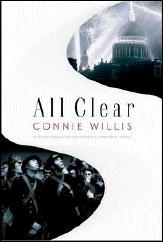Steve Wishnevsky weighs in with a review that reminds me of a quote that’s been widely circulated as having been written by Abraham Lincoln when reviewing a book: “People who like this sort of thing will find this the sort of thing they like.” Whether Lincoln really said it, I have no idea. One can find all sorts of quotes on the Internet. But sometimes, it’s fitting.
By Stephen Wishnevsky
ALL CLEAR. By Connie Willis. Random House. 2010
A more in sorrow than anger review. I really like and respect Connie Willis; her To Say Nothing of the Dog is a modern classic, wry poignant, period-perfect, a take off of the Victorian Three Men in a Boat, by Jerome K. Jerome. That book mixes time travel, a genteel post-apocalyptic England, satire of Victorian customs and a lot more in a deceptively soft novel that I am sure I miss 60 percent of, being a barbarian, don’tcherknow?
Plenty of obfuscation and glee, smoothly paced, but that book was a 500 pager. All Clear and its prequel Blackout are each over 600, and there is about 400 pages too much information in the work.
In the first volume, three time travelers get sent back to the London Blitz to observe. They soon discover that they cannot get home, their “Drops,” the connections to their future, are not happening. They are stranded, bombs are falling, and worst of all, they fear that any misstep on their part, any disruption of the preordained flow of history, will change the future and erase themselves from existence. Angst ensues. And continues to ensue for 800 pages. It is the science fiction equivalent of writer’s block.
There used to be a common meme in “Literary Fiction” of books about writers angsting about writer’s block. I must say I never had any inclination to read one of these works, and now I found myself halfway into a book about three people worrying about dismal probabilities for-seeming-ever. Stasis. One character is contemplating suicide to prevent disrupting the continuum, while bombs fall all about. It may be a metaphor for modern life or something, but my own personal life is too short for such diversion.
Willis is a great writer. She has won ten Hugo awards, the most of any writer, and will probably win another for these two books, but I can’t praise this work. It was hard enough in the first book, to accept a constant stream of miscues and ailed appointments in a 2060 with no cell phones and no IM, but my suspension-of-disbelief-mobile gave out about a hundred pages into the second book. Only my sense of duty, and of course the munificent remuneration I receive for these labors kept me to the task. [Editor’s note: Ha!]
And, since this is science fiction, you know there has to be a resolved happy ending, and there is. It is artfully enough foreshadowed, and the last 50 pages are a delight, but it sure takes a damn long time to get there. But if you love this sort of thing, this here is a masterpiece of that type of stuff. And welcome to it.
